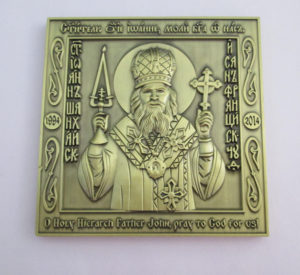Saint John of Shanghai

The Official Commemorative Medallion in Honor of the 20th Anniversary of the Canonization of Saint John of Shanghai and San Francisco the Wonderworker (1994-2014)
In the name of the Father and the Son and the Holy Spirit: Dear brothers and sisters. Today we remember Saint John of Shanghai and San Francisco. His title reflects his first posting as a bishop in China and the last posting in the U.S. Bishop John was the holiest person among the Russian ‘diaspora’, and yet was persecuted towards the end of his life by his own people. Some beleived him to be insane. The Russian Orthodox Church Abroad having fled cruel persicutions on account of their faith, herself became the persecutor of the current holiness living in its midst, through most of her Hierarchs. It is easier to honour saints from a distance, after a certain time has elapsed and everything is clear.
A famous hieromonk named Seraphim Rose called the bishop «wonderworker of last days». St. John was forever an invigorating pastor of Christ’s herd, always alert literally speaking. From the moment of his tonsuring into monastic order, and for the rest of his life, this person forbade himself to rest in a lying down position! He found within himself the strength to manage everywhere his help was required and often life saving. No obstacle existed on his path toward loving mankind.
In 1940 Shanghai was devided into three zones controled by the Chinese, the Japanese, and the English troops. Gunfire was often heard and citizens were afraid to go out unto the streets. Nevertheless bishop John, without fear, often went to the most dangerous areas in search of orphan children. He would return in his torn from barbwire cassock, each time bringing with him at least one child saved from death. An orphanage started by St. John and named after St. Tikhon of Zadonsk, saved the lives of hundreds of poor children.
The life of bishop John was not only one of prayer and service to God. At any time and during its entirety his life belonged to those in need. Often his help was needed by those whom had lost all hope in reciving any help or sympathy. Finding and helping poor people was as much part of his life as his daily monastic prayer effort. Serbian Saint Nicholas (Velimirovich) said about him the following «if you wish to see a living saint – go to Fr. John».
Another aspect of bishop John tells us that he also was a heroic ‘fool for Christ‘. On many photographs he appears different than that of an important Orthodox bishop. His figure amongst a ceremonial row of bishops, often is small and simple, with a completely childish face. Even on some icons he appears wearing a crooked archbishops ‘klobuk’. This servant of God, even from Eternity, reminds us of Christ’s words: «Why do you worry about clothes?…» (Matthew. 6,28). External good looks will not benefits us, if inside we are hiding an exceptional hell. While serving as a priest in a Russian church in Paris, Fr. John Maximovich brought upon himself indignation among some aristocratic parishioners whom complained to Metropolitan Evlogy that he was walking barefooted on the ‘Champs Elysee’. The metropolitan sent Fr. John written orders, tha from then on «he must wear shoes». The next day, a serious Fr. John was seen, hurrying through the city as usual, to help the needy and homeless, previously barefooted, now with shoes in his hands.
Bishop John was a tireless preacher. He was not known for the beauty of his speeches, but rather like prophet Moses, sluggish in his speech. When one first listened to his recorded speech, for the first few minutes one would be confused on account of not understanding even one word of the sermon. It was not a deffect in copying, because if one continued to listen, one would understand everything which the speaker said. He preached the Lords Word, beleiving and knowing, that these words would reach man’s heart, not concerning himself with the external sound and beauty of speech. His words were simple but powerful! Now, Bishop John of Shanghai is venerated around the world. We must try to immitate him in our efforts to strengthen our holy faith and safeguarding our children from sin, in simplicity and holiness. Holy Fr. John pray for us. Amen.




 Save as PDF
Save as PDF